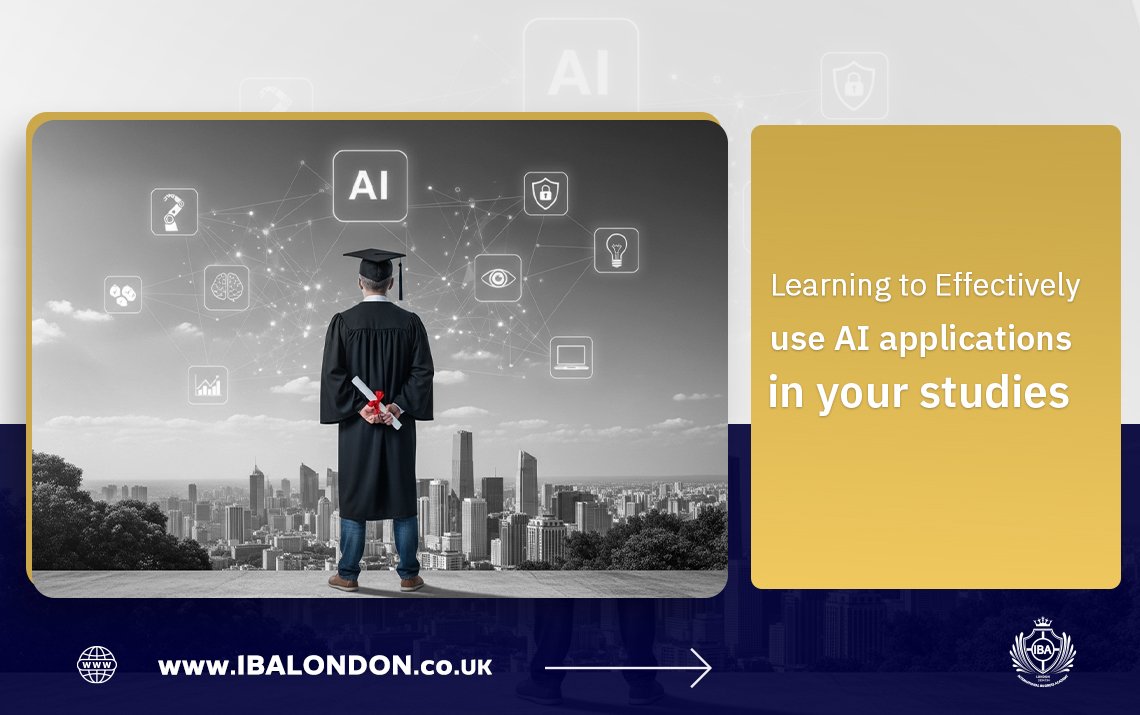
Learning to Effectively use AI applications in your studies
Understanding the Role of AI in Education
AI applications have made their way into almost every educational process: research, writing, data analysis, language learning, scheduling, and more. Today’s AI tools are not merely novelty add-ons—they are integral to modern academic success.
Common Artificial intelligence Tools Used by Students:
- Language models (e.g., ChatGPT, Gemini, Claude) for writing assistance and idea generation.
- Note-taking apps with Artificial intelligenceI transcription and summarisation (e.g., Otter.ai, Notion AI).
- Reference managers with Artificial intelligence sorting and citation formatting (e.g., Zotero, EndNote, Mendeley).
- AI-powered tutoring platforms (e.g., Khan Academy's Khanmigo).
- Text-to-speech and speech-to-text tools for accessibility and learning on the go.
- Grammarly and Quillbot for AI-based proofreading and paraphrasing.
While these tools offer significant benefits, they must be used thoughtfully to enhance—not replace—core learning.
Why Learn to Use Artificial intelligence Effectively?
At IBA London, we encourage learners to view Artificial intelligence not as a shortcut, but as a cognitive enhancer. Effective Artificial intelligence use can:
- Save time on administrative tasks.
- Support research with quick access to summaries, definitions, and explanations.
- Encourage deeper inquiry by providing multiple perspectives.
- Enhance clarity in academic writing.
- Foster independent learning and personalised revision strategies.
But without proper understanding and boundaries, students risk:
- Overreliance on generic or inaccurate content.
- Plagiarism and breaches of academic integrity.
- Shallow engagement with critical theories and concepts.
- Lack of original voice in assignments and research papers.
Thus, learning how to use Artificial intelligence effectively becomes just as important as learning what to study.
Practical Ways to Integrate Artificial intelligence into Your Study Routine
Let’s explore some effective, ethical, and academically sound ways to use Artificial intelligence.
1. Use Artificial intelligence for Brainstorming, Not for Final Submissions
Artificial intelligence is excellent at generating ideas, outlining arguments, and identifying key themes. Before writing your essay or project, you can prompt Artificial intelligence to:
- Suggest essay structures.
- Provide definitions and brief explanations.
- Offer opposing arguments or counterpoints.
Tip: Use AI-generated outlines to spark your thinking but always write in your own words. Do not submit AI-written content without significant revision and critical input.
2. Enhance Research with AI-Assisted Summarisation
Tools like ChatGPT or Elicit can summarise academic articles, helping you grasp key arguments before you do a full read-through. This is particularly helpful in time-sensitive environments.
Tip: Use Artificial intelligence to speed up your initial understanding, then dive into full articles for citation and deeper analysis.
3. Improve Your Writing with Artificial intelligence Feedback
Grammarly and Quillbot can help correct grammar, improve sentence structure, and suggest paraphrasing. These tools enhance the readability and clarity of your writing.
Tip: Use Artificial intelligence to polish your draft, but avoid over-editing that removes your academic voice. A well-written paper should still reflect your thinking and tone.
4. Use Artificial intelligence for Revision and Self-Testing
Many platforms now allow you to paste your study materials and request practice questions or summaries.
Example prompts you can use:
- “Summarise this article in bullet points.”
- “Create 5 practice questions from this text.”
- “Explain this theory like I’m a beginner.”
Tip: Test yourself using Artificial intelligence-generated quizzes. Make revision active, not passive.
5. Organise and Prioritise with Artificial intelligence
Artificial intelligence -powered planning tools (like Notion Artificial intelligence or Motion) can help you create schedules, organise tasks, and even suggest the best times for deep work or review.
Tip: Use Artificial intelligence as your academic assistant, but check for accuracy—Artificial intelligence sometimes miscalculates deadlines or misinterprets instructions.
Maintaining Academic Integrity in the Age of Artificial intelligence
As Artificial intelligence tools become more advanced, universities—including IBA London—are reinforcing standards of academic integrity. Students are expected to submit work that reflects their own understanding, supported by legitimate sources.
Guidelines to Keep in Mind:
- Disclose your use of AI tools where appropriate.
- Do not submit AI-generated work as your own—this could lead to academic penalties.
- Always fact-check AI outputs; they can contain hallucinations or errors.
- Use Turnitin or other plagiarism checkers before submission to ensure originality.
Best Practice: Treat AI as a mentor or guide, not a ghostwriter.
Developing Artificial intelligence Literacy as a 21st-Century Skill
Beyond academia, Artificial intelligence literacy is fast becoming a vital employability skill. Businesses are adopting Artificial intelligence tools in marketing, project management, finance, human resources, and logistics. By using Artificial intelligence effectively now, students build confidence and competence for their future careers.
At IBA London, we actively integrate Artificial intelligence ethics, applications, and digital agility into our curriculum, ensuring learners are well-prepared for the demands of the modern workplace.
AI Etiquette: When and How to Ask for Help
If you’re using generative AI tools like ChatGPT, consider the quality of your input (prompt). The better your question, the more useful the response.
Good Prompt vs. Weak Prompt Example:
- “Write my MBA assignment for me.” (Unethical and generic)
- “Give me a brief outline of Porter's Five Forces with examples relevant to the airline industry.” (Useful, ethical, focused)
Tip: Always use your own judgment to edit, critique, and add context to the answers Artificial intelligence provides.
Final Thoughts: Artificial intelligence as Your Study Partner, Not a Substitute
Artificial Intelligence is here to stay—and when used responsibly, it can elevate the learning experience. For students at IBA London and beyond, the key is to develop critical AI literacy, practice academic discipline, and embrace AI tools as learning companions, not crutches.
Artificial Intelligence is here to stay—and when used responsibly, it can elevate the learning experience. For students at IBA London and beyond, the key is to develop critical AI literacy, practice academic discipline, and embrace AI tools as learning companions, not crutches.
Want to Learn More?
Join one of our webinars or workshops on Artificial intelligence in education—available to all current learners.


